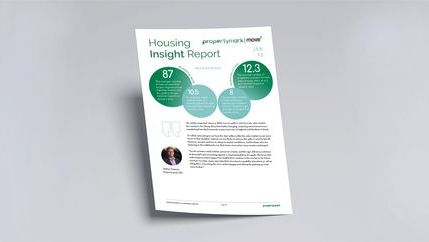900.000 more sole traders and landlords to be swept into Making Tax Digital
The UK Government’s Making Tax Digital (MTD) initiative is transforming how taxes are reported and managed, with significant implications for property agents. Self-employed individuals and landlords earning over £50,000 per year must comply with MTD for Income Tax Self-Assessment (ITSA) from 2026, and those earning over £30,000 from April 2027. In her Spring Statement on 26 March 2025, Chancellor Rachel Reeves, MP, announced that the threshold will decrease to £20,000 in 2028.
Public Accounts Committee calls for urgent improvements to cladding remediation programme
Eight years after the Grenfell Tower tragedy, which claimed 72 lives, tens of thousands of people remain in unsafe homes, with remediation efforts slow and riddled with uncertainty, according to the new report from the House of Commons Public Accounts Committee.
Spring Statement reinforces housing as an economic keystone
Chancellor Rachel Reeves has delivered her Spring Statement, outlining the UK Government’s plans for housing, planning, and welfare benefits as part of its broader economic strategy. The Statement was framed as a continuation of the government's existing strategy rather than a full Budget, with no major tax changes and only a limited number of new policies aimed at correcting a gap in public finances.
The real cost of non-compliance: what letting agents can't afford to ignore
Compliance in the UK lettings sector is often treated as a box-ticking exercise. Gas Safety Certificates, EPCs, and Deposit Protection Schemes are the well-known essentials that every agent expects to manage, but the real risks don’t always come with a checklist. Oversights can lead to crippling fines, legal battles, and reputational damage, with the biggest threats often lurking in grey areas of legislation, quiet regulatory changes, and obligations that only become clear when something goes wrong.
Reform of EPC fees must balance costs with benefits
The Scottish Government has launched a technical consultation on proposed changes to lodgement fees and penalty charges as part of its ongoing reform of Energy Performance Certificates (EPCs). This follows the publication of the Scottish Government’s response to a 2023 consultation on EPC reform and outlines plans to introduce new EPC regulations in 2025, with enforcement scheduled for 2026.
Welsh Government announces highest-ever investment in flood protection
The £77 million investment in flood protection for 2025-26, is aimed at safeguarding communities from the increasing threat of climate change. Deputy First Minister Huw Irranca-Davies MS unveiled the plans in the Senedd, emphasising that the funding comes at a crucial time following severe storms that affected hundreds of properties across Wales.
Leasehold insurance reforms must tackle root causes
The Ministry of Housing, Communities and Local Government (MCLHG) and the Welsh Government have proposed new regulations overhauling how insurance costs are charged to leaseholders in multi-occupancy buildings, to increase transparency and prevent leaseholders from being overcharged through commissions and hidden fees. While Propertymark supports efforts to ensure fairness for leaseholders, we have warned Ministers that these reforms alone will not bring down insurance premiums; a focus on building safety and insurer confidence is needed to achieve real change.
Welsh Government incentivises development of affordable housing
The Welsh Government has committed £90 million in low-interest loans to Registered Social Landlords (RSLs) to support the delivery of affordable housing and improve existing homes across Wales. The funding aims to help RSLs manage the rising borrowing costs while ensuring the continued development of much-needed affordable homes. The latest round of loans will contribute to the delivery of 277 new homes, with 119 expected to be completed within the current Senedd term.
How to avoid complaints in the PRS: six steps for letting agents and landlords
With the Renters’ Rights Bill on the horizon, the private rented sector (PRS) is set for significant change. As part of this, the bill will be introducing an Ombudsman which will hold landlords and letting agents to higher standards of accountability, ensuring tenants have a clear route to escalate disputes. Proactive landlords and agents can take steps now to prevent issues from reaching this stage, saving time, stress, and reputational damage in the process.
Protections from debt recovery should be reserved for those most in need
The Scottish Government is consulting on the process for a Mental Health Moratorium designed to give people with severe mental health conditions respite from debt recovery action, including rent arrears. Propertymark supports the proposals with recommendations to ensure the scheme works effectively in practice and recognises the rights of landlords.
Propertymark calls for realistic, fair, and effective action of fuel poverty
The Northern Ireland Executive has published a draft Fuel Poverty Strategy with proposals for improving energy efficiency in homes, protecting consumers, and fostering collaboration across sectors. Propertymark supports the key principles but has highlighted critical areas that need further consideration, including achievable timescales, sensible exemptions, and cost caps that reflect property values.
Housing Insight Report: January 2025
As widely expected, there was an uplift in activity in the sales market due mainly to the Stamp Duty thresholds changing in April, which will see many homeowners pay more property tax in England and Northern Ireland.
A stark warning on property fraud as man regains possession of stolen home
Fraudsters exploited the vulnerabilities in the property transaction system by stealing a homeowner’s identity and using a fake driving license to set up a bank account in his name to facilitate a sale in 2021. After four years, on 11 March 2025, a County Court finally granted the owner full possession of his home.
Bold Planning and Infrastructure Bill could present opportunities for the property sector
The Bill aims to modernise the UK's planning system, promoting rapid housing development and infrastructure while balancing environmental sustainability. Members should prepare for a dynamic landscape with new opportunities and responsibilities as these reforms take effect, offering new avenues for growth while necessitating adaptability to regulatory changes and a commitment to sustainable development.
Major Universal Credit changes will affect rent payments from April 2025
The Universal Credit Fair Repayment Rate will drop from 25% to 15%, reducing the amount available to service an individual’s monthly debts, including housing payments. Furthermore, the Department for Work and Pensions (DWP) is set to overhaul the system of the automatic deduction of arrears and ongoing rent payments directly from tenants' Universal Credit or other benefits, following a court ruling which deemed the practice unlawful.
TLP helps agents build brand value and reputation
Client accounting goes beyond bookkeeping—it's key to an agent’s reputation. An agent’s brand can take years to build but can be undone in days when something goes wrong. A strong reputation drives referrals and precedes first contact with new clients, landlords, suppliers and prospective staff. A strong local brand helps the agency grows faster and gain more value, so protecting and nurturing it has to be a top priority for any manager or owner.

















